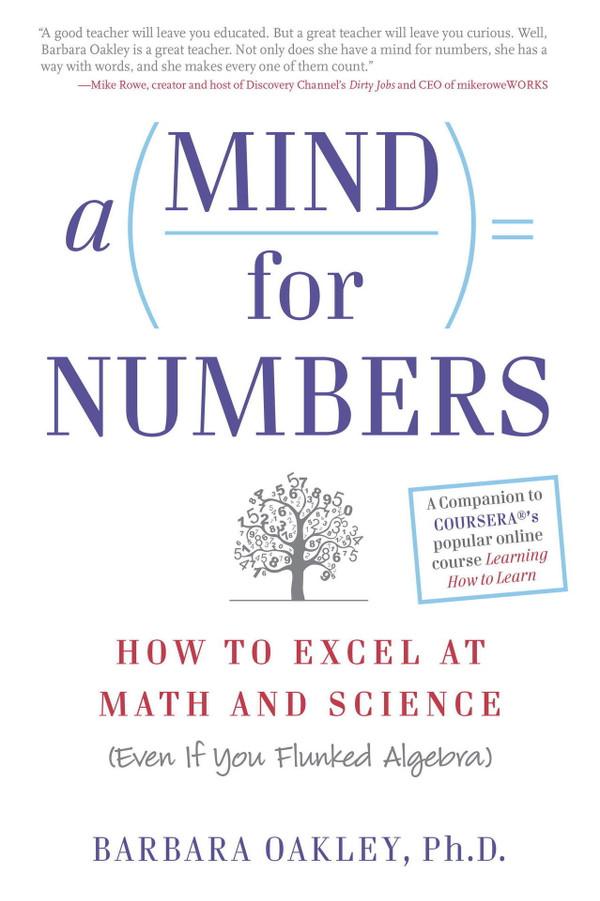Courtney Abbott's Key Ideas from A Mind for Numbers: How to Excel at Maths and Science
by Barbara A. Oakley
Ideas, facts & insights covering these topics:
10 ideas
·35.8K reads
161
Explore the World's Best Ideas
Join today and uncover 100+ curated journeys from 50+ topics. Unlock access to our mobile app with extensive features.
Focused thinking and diffused thinking
- Focused mode is used to concentrate on something that’s already tightly connected in your mind because you are familiar and comfortable with the underlying concepts.
- The diffuse approach involves a big-picture perspective. Useful when you are learning and understanding something new. As long as we are consciously focusing on a problem, we are blocking the diffuse mode. Do something else until your brain is consciously free of any thought of the problem.
You need to use both big-picture, or focused mode and detail-oriented, or diffuse thinking to get good at math and science.
681
5.66K reads
Create the best conditions for focused and diffuse thinking
Focused thinking needs meaningful stretches of undisturbed time to focus and think.
- Prioritize making distraction-free time and space to think deeply
- (SQ3R: Survey, Question, Read, Recall, Review)
- Practice purposefully (Work the hardest bits, generalize through variation)
- Think on paper, there’s magic between the hand and the brain
Diffuse thinking occurs subconsciously by temporarily loosening attention.
- Relax/disengage attention: Sleep, walk, drive, blink, exercise
- Recall and test frequently (e.g., spaced repetition techniques).
Actively build time into each day to alternate between both modes.
685
4.34K reads
Conceptual chunks
One of the first steps towards gaining expertise in math and science is to create conceptual chunks.
Once you chunk an idea or concept, you don’t need to remember all the little underlying details; you’ve got the main idea - the chunk - and that’s enough.
Basic steps to forming a chunk:
- Focus your attention on the information you want to chunk. No television on in the background, don’t look at your phone, etc.
- Understand the basic idea you are trying to chunk.
- Gaining context so you see not just how, but also when to use this chunk.
629
3.02K reads
Focus on process instead of product
Unfortunately, many of us find it too easy to procrastinate even starting our math homework because we see it as boring and difficult. This thinking comes from focusing on the idea that we only want to finish our work.
If we instead look at our goal as “For the next 15 minutes I’ll work on this math assignment,” it becomes a lot easier to just begin. When we center our mind on only the process of learning, it’s easier to just go with the flow and relax.
662
2.96K reads
Interleaving versus overlearning
Interleaving means practicing by doing a mixture of different kinds of problems requiring different strategies.
Overlearning means continuing to study or practice a problem immediately after some criterion has been achieved. For example, correctly solving a certain type of math problem and then immediately solving several more problems of the same kind.
Overlearning provides diminishing returns.
615
2.97K reads
Enhancing your memory
Learning to use your memory in a more disciplined yet creative manner helps you learn to focus your attention.
- One of the best things you can do to remember and understand concepts in math and science is to create a metaphor or analogy for them.
- Use spaced repetition to help lodge ideas in memory.
- Create meaningful groups that simplify the material you are trying to remember.
- If you are memorizing something commonly used, search online to see if someone has already come up with a particularly memorable memory trick.
- Beware of mistaking a memory trick for actual knowledge.
623
2.58K reads
Writing to improve your memory
There is a direct connection between your hand and your brain. The act of organizing and re-writing your notes is essential to breaking down large amounts of information into smaller digestible chunks.
Writing and saying what you are trying to learn seems to enhance retention.
609
2.55K reads
The Einteilung Effect: An idea you already have in min, or your simple initial thought, prevents a better idea of solution from being found.”
BARBARA OAKLEY
575
3.12K reads
Articulating your question is 80 percent of the battle. By the time you’ve figured out what’s confusing, you’re likely to have answered the question yourself!
KENNETH LEOPOLD
619
4.86K reads
Learning is often paradoxical. The very thing we need in order to learn impedes our ability to learn. We need to focus intently to be able to solve problems – yet that focus can also block us from accessing the fresh approach we may need. Success is important, but critically, so if failure. Persistence is key – but misplaced persistence causes needless frustration.
BARBARA OAKLEY
588
3.71K reads
IDEAS CURATED BY
Curious about different takes? Check out our A Mind for Numbers: How to Excel at Maths and Science Summary book page to explore multiple unique summaries written by Deepstash users.
Courtney Abbott's ideas are part of this journey:
Learn more about education with this collection
Cultivating a growth mindset and embracing challenges
Developing adaptive thinking and problem-solving skills
Effective learning frameworks and approaches
Related collections
Different Perspectives Curated by Others from A Mind for Numbers: How to Excel at Maths and Science
Curious about different takes? Check out our book page to explore multiple unique summaries written by Deepstash curators:
1 idea
Elina Haber's Key Ideas from A Mind for Numbers
Barbara A. Oakley
1 idea
Amberlynn Bee's Key Ideas from A Mind for Numbers
Barbara A. Oakley
1 idea
Anurag Bhatt's Key Ideas from A Mind for Numbers
Barbara A. Oakley
Discover Key Ideas from Books on Similar Topics
3 ideas
Waldorf School Education
Sprouts
7 ideas
How Not to Be Wrong
Jordan Ellenberg
9 ideas
The Programmer's Brain
Felienne Hermans
Read & Learn
20x Faster
without
deepstash
with
deepstash
with
deepstash
Personalized microlearning
—
100+ Learning Journeys
—
Access to 200,000+ ideas
—
Access to the mobile app
—
Unlimited idea saving
—
—
Unlimited history
—
—
Unlimited listening to ideas
—
—
Downloading & offline access
—
—
Supercharge your mind with one idea per day
Enter your email and spend 1 minute every day to learn something new.
I agree to receive email updates






